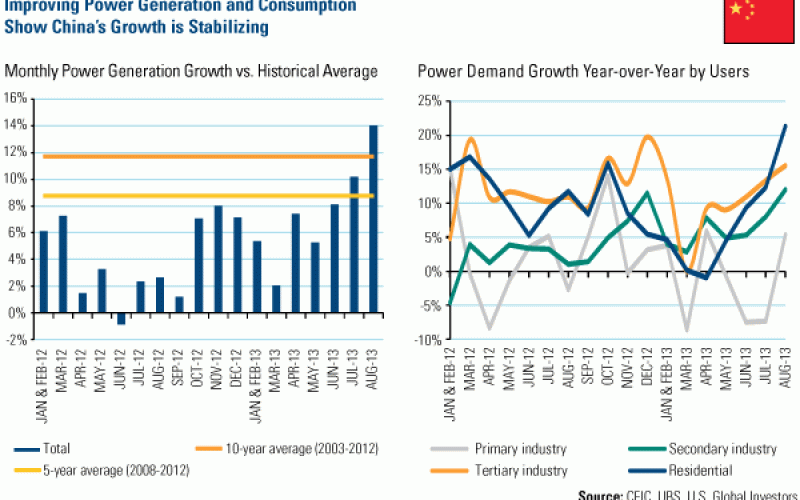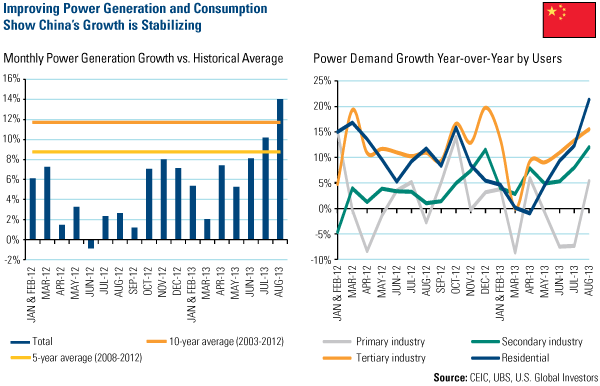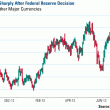Emerging Markets Radar (September 23, 2013)
Strengths
- Passenger vehicle sales in China went up 14 percent in the first two weeks of September. As the overall auto sector steps into the seasonal boom, Bank of America Merrill Lynch expects auto stocks to rally in the short term. This forecast comes on a wave of positive news flow and catalysts. The firm also forecasts growth between 16 and 15 percent year-over-year for 2014 and 2015, respectively.
- Reportedly, the China Security Regulatory Commission is studying a bank preferred share trial, claiming to support issues by banks to expand financing channels.
- Technical forecaster Tom DeMark commented that the Shanghai stock market will extend its gains as the Chinese economy strengthens. Earlier this year he predicted a market rally at the end of June for Shanghai.
- The China Security Regulatory Commission approved the Dalian Commodity Exchange to begin trading iron ore futures.
- Zhoushan City in Zhejiang province has eased purchase restrictions in the property market by permitting all households to buy a new home this year. Separately, China may allow real estate investment trusts, or REITs, as part of loosening its property financing policy, the China Securities Journal reports.
- Malaysia’s headline inflation eased slightly to 1.9 percent year-over-year in August versus 2.0 percent in July, with 2 percent as the consensus.
Weaknesses
- China’s August foreign direct investment grew 0.6 percent to $8.38 billion. This was below the market expectation of a 12.5 percent gain.
- Two private banks in China, Suning Bank and Huarui Bank, were launched under a policy reform encouraging private capital. The launch was done in order to get into industries previously licensed solely to state-owned enterprises (SOEs). The reform will be extremely positive for the economy, but it is negative to the incumbent banks since competition will squeeze profit margins through rising deposit rates and falling lending rates.
- Singapore’s non-oil domestic exports (NODX) declined in August by 6.2 percent year-over-year versus the consensus of 2.4 percent growth, extending the decline in July by 1.9 percent.
Opportunities
- As shown in the charts above, China’s power generation and consumption have been increasing since June. Particularly, the increase in industrial power consumption has coincided with industrial production growth in August. August power generation went up 14 percent and power consumption 13.5 percent, which may indicate a short-term growth recovery in China.
- Despite a slight deterioration in June’s unemployment data, labor participation in Turkey is at an all-time high in a counter trend to OECD economies, boding well for domestic consumer demand.
- According to Russia’s Finance Minister Anton Siluanov, the Russian government has approved a budget plan that includes Russian state companies paying out 35 percent of International Financial Reporting Standards (IFRS) earnings in 2016 (on 2015 earnings). Nothing has been mentioned yet about 2013 and 2014 earnings, though it makes sense that 25 percent on 2014 earnings would mean 35 percent on 2015 earnings.
Threats
- Recent acceleration in the growth of housing prices, along with the potential for local government tightening, may defer a price recovery for developer stocks. There is news that developers are paying record-high land prices, making them vulnerable on tightening as well as on a sector slow down.
- The European financial transaction tax is designed to discourage speculative trading and raise tax revenues, but the tax could actually kill off the repo market which the banks rely upon for funding.
- The recent bailout of two of the Slovenian banks at the taxpayers’ expense was in violation of the European Union’s resolution mechanism applied to Cyprus, perpetuating the seemingly haphazard approach to crisis management.















